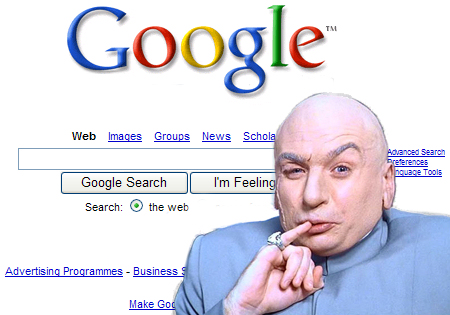Google has declared war on the open Internet
I’ve been a self-described Google whore for a long time now. I started using the search engine not long after it first went public (and displaced then-giants like Yahoo and AltaVista), I got in on the Gmail beta way back in late 2004, and Chrome has been my go-to browser for the last several years. I’ve owned Android phones for over three years, Google Reader took over my RSS duties in 2008, and I got into Google+ on the second day of the beta. To say that my online life is heavily Google-centric would be an understatement.
And yet, I’m seeing that Google has decided to throw its motto of “don’t be evil” right out the window. It started last week when they announced that Google Reader was going to be killed off in less than three months. I was floored at this decision. I’d built a finely-tuned workflow around Reader that made wading through 800+ posts a day a matter of maybe 30 minutes. I was even perfectly happy with killing off the social features of Reader for Google+ since the latter would show in my search results. So what if it hadn’t been updated? It was working great for me and, as I’ve learned, hundreds of friends and acquaintances.
The statement they released, that they wanted people to focus on Google+, sent an absolute chill up my spine despite being an enthusiastic user of their service. It reeked of “like my Facebook page” or “follow me on Twitter”, approaches that stick people in walled gardens. The message is clear: stop following RSS feeds, stop publishing RSS feeds, and put your content on our service instead. I wouldn’t be able to quickly scan the headlines anymore, and sharing content outside of the walled garden would be an incredibly difficult task. All of the utility of open standards would go right down the drain in Google’s pursuit of lock-in, a tactic reserved for giants protecting their turf, not innovators who attract and retain users through best-in-class products.
Google says it wants to pursue a social strategy, but it has just revealed that it doesn’t really understand what that means. The entire point of Google+ is to add increasingly useful curated search results from your social connections. Reader feeds that by providing an easy way to find and share content from the sources you trust most without an information overload. By removing a major source of that curated layer, arguably from the most influential user base, they’re shooting themselves in the foot. “Reshare content in the walled garden”, they say, but Google+, as good as it is, doesn’t handle drinking from the fire hose very well.
The entire decision seems to be thinking that forcing people into Google services, rather than demonstrating their utility and letting that speak for itself, is some kind of winning strategy. It’s not. It’s pissing users off in a way that I think they seriously miscalculated. As someone else pointed out, the whole “focusing on our core strengths” nonsense rings pretty hollow when their hottest projects are a fiber network in Kansas City, fancy glasses with a built-in camera, self-driving cars, and notebooks that nobody is actually buying.
This knife in the back of RSS is big enough to signal that Google isn’t interested in openness anymore, but it’s not the only sign. An early warning shot was when Google Shopping went from a relatively useful (if often gamed) pricing search engine to a pay-for-play listing service. More recently, Google blocked anyone outside of Gmail from inviting Gmail users to chat. Their explanation is that it’s an attempt to curb spam (which I’ve seen maybe twice since Talk got introduced), but it’s pretty darn hamfisted for a company that manages to only drop one piece of spam every three months into my inbox while sending thousands of others into the digital dustbin.
How long will it be before Google kills tons of other services the same way? Feedburner likely has a target on its back since its only purpose is interfacing with the RSS standard that Google now seems to despise. Blogger will probably get killed and you’ll be told to post on Google+ instead and like it. Google Groups? Go use Google+ Communities. It’s only a matter of time before your favorite service could end up on the chopping block.
I’m starting to very seriously reevaluate my relationship both with Google and any other service provider, as per the recommendation of the on blast blog I occasionally read. I already started blogging again as a way to own my content. Now I’m dedicated to making sure that my replacement for Reader is similarly self-hosted so that it can’t be turned off. I’m going to switch my accounts away from using my Gmail address to the one associated with my own domain (and I will be backing up email locally just for good measure). As much utility as I get from a homogeneous hosted platform, I need to be able to have a contingency when those services get pulled. I suggest you consider doing the same.




Google is definitely evil. For me, this is most evident with Google Analytics, which aggregates granular data about thousands upon thousands of websites so that Google can optimize its AdWords business. This is fine and dandy if you’re CoolestFamilyEver.com and just want some functional analytics on your site, but the problem comes when big businesses get conned in to thinking that Google Analytics is free, when in reality, there is a major cost to it because you are giving Google your online playbook — in Google Analytics, just like everything else you do on Google (Docs, Email, Google+)…Google owns your data, and they can do whatever they want with it.
That is evil. The only thing that keeps it from being pure evil is they do tell you they’re doing this, it’s just the utility of Google services is high enough that no one listens/cares.
For a long time, I was fine forking over my data because I felt I was getting a lot of value in return and could find easy alternatives. Now I’m not quite so sure. Trying to find a replacement for Reader has proven to be quite a chore, and I’m fearful that I’ll run into the same issues down the road.
That’s really my problem, that the value proposition is being changed decidedly in their favor. It feels like a suit decision, not an engineering one. If it was, Reader would be folded into something at least as good. Notebook was replaced with Docs/Drive, Buzz and Wave were replaced by Google+, and Videos was replaced by YouTube. All of those are cases where sunsetting the product gave you something far superior that accomplished the same ends. This isn’t one of those.
First, I read your post on Googles’ reader. I am still wondering, where I will go next. I have tried other services (see second), and none of them are good.
Second, in a little personal experiment, I went Google free for a little over a year. I tried surfing the web, for service that provided the same features as Google, but without Google. And the only feature I couldn’t find a suitable substitue, was their image search engine, and their reader.
Third, I just returned to using the Google Reader. I decided that it was just too good to give up. And now, I find that it has given up on me. I guess I will have to give up on reading other’s blogs. Because I am not going to Google+.
Fourth, someone needs to step in, buy this feature from Google, and then sell it back when they come begging to have it again.
For techies with the skills (and a host) to set it up, Tiny Tiny RSS gets pretty darn close to Reader-like functionality. It even offers multi-user support. Once I finish playing with a few self-install alternatives, I’m going to write about my impressions of each of them.